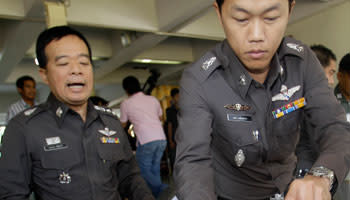British couple 'killed by bed bug spray' on holiday

The deaths of seven tourists – including an elderly British couple – have been connected to a toxic bed bug pesticide found in the Thailand hotel they all visited.
Pensioners George Everitt, 78, and his wife Eileen, 73, were found dead in their room at Chiang Mai’s Downtown Inn while in the northern tourist resort of Chiang Mai on 19 February.
Their deaths are the latest in a string of fatalities that occurred during the months of January to March, including that of 23-year-old New Zealander Sarah Carter less than two weeks ago.
According to Thai authorities, Mr and Mrs Everitt suffered fatal heart attacks within minutes of each other, though family members say the couple had no history with heart problems.
Ms Carter became seriously ill on 3 February while staying at the hotel. She was taken to a local hospital but died from heart inflammation one day later.
The condition of her two travelling companions who were sharing her room also deteriorated, and one survived only after emergency heart surgery.
Thai officials were quick to attribute the deaths to ‘toxic seaweed’ that was being sold at a nearby bazaar, but the persistent campaigning of Ms Carter’s father Richard over what he alleges is a "cover up" has sparked extensive probes from the media.
An investigation aired by New Zealand's 60 Minutes program found small traces of the insecticide chlorpyrifos – used to kill bed bugs – in the hotel room Ms Carter was staying in.
Reporters for the program posed as hotel guests and took swabs from the fifth floor room, which then underwent tests.
United Nations toxicologist Ron McDowall, who carried out tests on behalf of the channel, TV3, said the symptoms Ms Carter and the other tourists had suggested they had died from an over exposure to the toxic chemical.
Dr McDowall got second and third opinions from experts in New Zealand and Italy who supported his belief.
"I think she has been killed by an overzealous sprayer who's been acting on the instructions of the hotel owner to deal with bed bugs," Dr McDowall told 60 Minutes.
The fact that chlorpyrifos was found three months after Ms Carter's death, and after the room was cleaned, suggests there was a high concentration of the toxin present while she was staying there, he said.
He added that tests done on Ms Carter’s body were useless due to the difficult nature of identifying poison from blood samples.
“The chemical is absorbed by the body very quickly. It only has a half-life of a day so it can be very hard to predict the event.”
Sarah Carter's father, Richard, said TV3 had presented a strong case chlorpyrifos had caused his daughter's death.
"I think they've proven that they really don't have an interest in resolving the issue, calling it a coincidence for a start, and also to have systematically gone around and covered up as much of the evidence as they possibly could when they had wind that TV3 were about to do an investigation,” he said.
A female Thai tourist guide was also found dead in the hotel the day before Ms Carter became sick, and another Canadian man who died did not stay in the hotel but is understood to have visited.
Thai police have raided the company in charge of eradicating insects at the Downtown Inn, and Chiang Mai’s Head of Public Health suspects the pest controllers could have made a mistake.
“It's possible that they mixed together the wrong chemicals,” Dr Surasing Visaruthrat said.
The governor of Chiang Mai, ML Panadda, claimed the tourists' deaths were just bad luck: “I do believe coincidence… it is a very bad occasion and such bad luck for that hotel.”
The Downtown Inn continues to operate, offering rooms from £25 a night.

 Yahoo News
Yahoo News 
